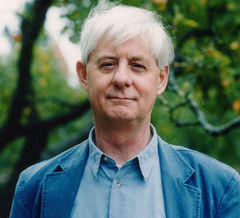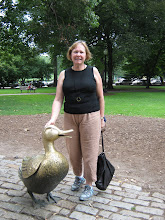Readers are made by readers - it is so obvious it is almost banal to say it.
Aidan Chambers
Recently I read about the death of Aidan Chambers, an author/educator who had a very profound affect on me as a teacher. When I was a young, inexperienced, but very passionate teacher who was very involved in the Primary English Teachers' Association I went to a workshop run by Aidan Chambers in Sydney. He outlined his Tell Me Framework using examples to show how each of his questions might work. The next day, back at school I tried it out with my Year 5 class using Where the Wild Things Are by Maurice Sendak. After the basic questions, I asked How long did it take for the story to happen? Well, I have never had a more vigorous discussion with students. It was a mixed ability class including five non-reading boys. There was a group of students who were convinced that it took a year and a day times two at least because that's how long it took Max to sail to the place where the wild things were. There was a group who thought it was only minutes because Max's dinner was still hot when he got home. One student said minutes because that is how long it took me to read the book. Then quietly, one of the non-reading boys said I think it was a month, because if you look at the moon pictures in the book it goes through the phases. He had studied the illustrations very closely. Then we had to go back and revisit the story to debate all these views. In the end we spent over an hour on this. I know that is a luxury in today's curriculum-heavy classrooms, but it did two things.
1. Converted me to the power of Book Talk, and
2. Taught me to never underestimate my students' opinions.
I was already 'into' Children's Literature because I had done it as a subject at university during my Undergraduate English degree, but as I undertook a Master's of Children's Literature I had Aidan Chambers in the back of my mind informing my thinking and classroom practice. After a stint teaching teachers where I read to them every session, I went back to a school as a teacher librarian.
Every session in the library with students convinces me of the importance of the reading environment, the importance of unknown texts chosen by a well-informed adult and the importance of giving students time to talk about books.
This brings me to why I believe schools need teacher librarians who read widely and who are very aware of authors, illustrators, translators, Children's Literature and Reading for Pleasure advocates. There should be a difference between a school library and the local library. At school I often have to remind some of the staff of this fact ...I am a teacher first and a librarian second.
Aidan Chambers said this eloquently in his talk Making Readers
For their part, children expect their teachers to know more than they do, and to know how to help them get to know more for themselves. They expect librarians to know about books and to know which books it might be worthwhile reading now, today. They expect the adults who are responsible for them to know how to help them go where they cannot go on their own. Children know what they want to read for themselves. They tell each other about those books. It hardly needs a paid professional adult to help them do that. What they want from professional adults is guidance about reading they would not have thought of, do not hear about from each other.
I think I am very good at doing this, but I butt heads with parents who think their child should only read and borrow what they like to read. They can do this at the public library. At school I expect that they will borrow 'a free choice book' which might be 'pulp' fiction, a graphic novel, a book from a loved series, a book a friend recommends, but I also expect them to take risks, try new genres, read nonfiction, biographies, poetry... and my book talks and book displays enable them to do this.
I am not adverse to children being taught phonics as a means to learning to read, but phonics is not reading. Reading is a lifelong experience. You get better at it, not by learning rules, but by reading everyday and doing it because you enjoy it. Phonics doesn't make a reader. It aids reading, but as teachers we want our students to love reading and schools need to reproduce the warmth, diversity and engagement that we see in families that read together. If we create this we will have students who read for pleasure from a wide variety of books and do so because it is pleasurable.


No comments:
Post a Comment